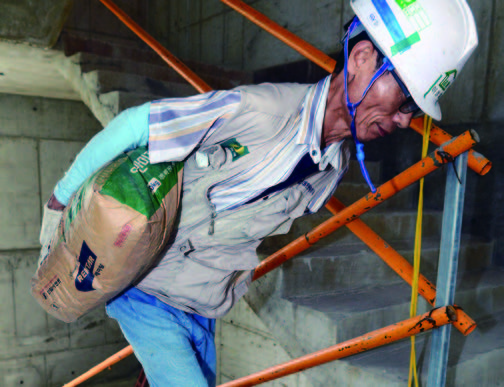October in Korea comes with various public holidays. To be more specific, September 30th to October 4th are designated holidays with Korean Thanksgiving, Chuseok, and National Foundation Day. Chuseok comes every year, and this year’s Chuseok holiday did not include any substitute holidays like Chuseok in 2017, which resulted in a difference in the length of this year’s holiday period. So, what are substitute holidays? The Sungkyun Times (SKT) decided to find out the goals and loopholes of substitute holidays and possible directions to move forward.
About Substitute Holidays
What Are Substitute Holidays?
Substitute holiday is a system that balances the number of annual holidays that was first implemented in 2013. When the holidays fall on a weekend, the total number of annual holidays of the year would be lesser than that of other years, so the next day of the last holiday is temporarily designated as a holiday. Substitute holidays, however, are different from temporary holidays. Temporary holidays are designated after public holidays, except for New Year’s Day, Chuseok, and Children’s Day. Also, according to Article 55 of the Labor Standards Act, substitute holidays are considered as paid holidays, while temporary holidays are not. Currently, public enterprises and enterprises with at least 300 employees are required to abide by the fully-paid substitute holiday system. Considering the preparation period necessary for smaller workplaces, for enterprises with 30 to 299 employees, the system will be implemented from 2021 and begin in 2022 for enterprises with five to 29 employees. The current government has announced that they will be applying substitute holidays to other holidays, but they have yet to keep their promise.
Goals of Substitute Holidays
➊ Guaranteeing Right to Rest
Before the implementation of substitute holidays, most of the countries in the Organization for Economic Co-operation and Development (OECD) except Korea had laws about employees’ right to rest. Therefore, at the time substitute holidays were first announced, Hong Ik-pyo, senior vice-chairman of the Presidential Commission on Policy Planning (PCPP), emphasized that guaranteeing the people’s right to rest would help economic growth and social stability. In fact, many people do take breaks during substitute holidays. According to a report that analyzed trends in domestic tourism during Chuseok in 2017, the number of travelers was 3.06 million, which has doubled since 2016. Also, labor productivity increased in the fourth quarter of 2017 after Chuseok. Productivity levels reached 110.2, an increase of 6.6 from the fourth quarter of 2016, and 8.2 from the third quarter of 2017.
➋ Promoting Domestic Demands
When the implementation of substitute holidays was first being discussed, nearly 70% of respondents from the Hyundai Research Institute (HRI) responded that they would use the holiday for a domestic trip. Economic policies should focus on promoting domestic consumption, which is an important factor for the Korean economy. According to the Ministry of Economy and Finance (MOEF), after the substitute holiday system was introduced, the retail sales index increased by 0.8%p from the previous month and was especially high during long weekends with a substitute holiday. Also, during these holiday periods, both department store sales and credit card approvals increased by 16% and 22.7% respectively compared to the previous year.

Loopholes of Substitute Holidays
Employees Side
➊ Polarization of Right to Rest
As of 2020, public enterprises and enterprises with more than 300 employees are required to guarantee their employees paid holidays. Based on a survey conducted by the recruiting website Incruit, however, 35.3% of employees from large enterprises responded that they went to work on substitute holidays, and about 30% of the respondents answered that it was because of the unfriendly environment for substitute holidays in the company. By 2022, all workplaces with at least five employees will be required to apply substitute holidays, but workplaces with fewer than five employees will still be in the blind spot of legislation. According to the Interviews from Maeil Business Newspaper (MBN), an employee who works in a startup company said she felt dejected when she heard that her company was too small to give her paid holidays. She added that the government should guarantee employees’ rights to rest regardless of the size of the company. In August of 2020, a petition was posted on the Cheongwadae website along with the claim that amendments must be made to the Labor Standards Act because some are unable to enjoy the benefits of substitute holidays.


➋ Employees That Do Not Welcome Substitute Holidays
Currently, many enterprises force employees to use their annual leave on substitute holidays. As a result, many employees decide to just go to work. According to interviews from MBN, an employee who works at a small-scale company, said that their company allows employees to use their annual leave on substitute holidays, but he said he would rather go to work and receive a salary than meaninglessly use up his annual leave. Also, itinerant workers and self-employed individuals do not welcome substitute holidays. This is because an increase in holiday periods leads to a decrease in income. According to a survey done by Korea Enterprises Federation in 2010, 85.3% of itinerant workers and self-employed individuals were in opposition to substitute holidays. Still, the government enforced substitute holidays insisting that all employees must be guaranteed to rest. The government failed to consider everyone’s needs.
Enterprises Side
➊ _Labor Cost Rises
According to the Labor Standards Act, companies must provide more than 50% additional wages for the workers who work on a public holiday, which is much higher than the International Labor Organization’s (ILO) standard of 25%. In fact, when calculating the wages necessary for the 16 holidays (based on the second half of 2019) considering the typical 130,000 won per average construction worker, the construction industry would have to shell out 3.13 million won per person. Moreover, enterprises would have to pay extra for workers’ public insurance and severance packages. It imposes more burden on the businesses that inevitably open on substitute holidays, such as restaurants or construction industries.
➋ _The Burden of Small and Medium-sized Enterprises (SMEs)
According to data from the Korea Federation of SMEs (KBIZ) in 2020, 39.7% of SMEs responded that if one of their machines shuts down, production and sales would be directly affected. In fact, as the number of holidays increases, the growth of the monthly export rate of the manufacturing industry falls by 4.4%p. Also, when substitute holidays are implemented, SMEs are unable to comply with the demand for large enterprises. The KBIZ reports that 33.3% of SMEs are unwilling to enforce substitute holidays to comply with the delivery requests. As there is no legislation on extending delivery deadlines due to substituting holidays, SMEs have no choice but to feel anxious. As SMEs are bound by their contractual relationships to large enterprises, it is expected that the implementation of substitute holidays will continue with a lack of cooperation from large enterprises.
Reconsideration of Substitute Holidays
For Government
The substitute holiday was created to promote employees’ life satisfaction by guaranteeing adequate days off for them. Therefore, it is necessary to continue conducting surveys about the working atmosphere of companies and provide employees with the right to rest before and after substitute holidays. Also, the government should provide subsidies such as job stabilization funds for itinerant workers and part-time workers to help them compensate for the lack of work during substitute holidays. Also, the government should give enterprises a helping hand to alleviate the burden associated with substitute holidays. If so, the real purpose of substitute holidays may be achieved for both employees and enterprises. The first method is to enforce a practical standard for additional wages during the holidays. About 25% would be appropriate, in reference to the basis set by the ILO. The second is to allocate funding to help owners of SMEs pay their employees' extra wages. The total amount of government subsidies distributed to promote local enterprises exceeded 270 billion won in 2019, and Professor Yoon Chang-hyun of the Department of Business Administration at the University of Seoul said that the government tends to subsidize local companies too easily, without clear standards. He argued that rather than solely promoting local companies, the subsidies should be provided to any company that plays a big role in developing Korea’s industrial economies. If the government were to invest in enterprises that abide by the substitute holiday system, enterprises will be able to prepare for the costs that come with the holidays much more comfortably.
For Enterprises
To guarantee workers to wholly enjoy their holidays, it is crucial to create a workplace culture that does not pressure employees to work during the holidays. Also, as Kim Kyung-man, head of the Division of Economic Policy of KBIZ, pointed out, SMEs would only be able to participate in the substitute holiday system if large enterprises were to extend delivery deadlines. Setting lenient delivery deadlines is a relatively easy task for large enterprises since substitute holidays are fixed and not subject to change. Finally, establishing a system to support enterprises’ administration of finance and logistics would be helpful to enterprises such as department stores that inevitably need to stay open during the holidays. These efforts will lead all enterprises to implement substitute holidays without much burden.

During the holidays, Kingos may have realized the benefits and drawbacks of substitute holidays. While the government has announced that they will begin applying the substitute holiday system to other holidays, we must first consider how we can alleviate the controversies regarding substitute holidays and think of ways to support enterprises that are trying to acknowledge the rights of their employees. Rather than assign blame to the government and corporations, Kingos should also take interest in the issue of substitute holidays.
